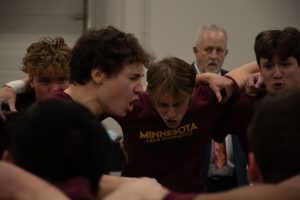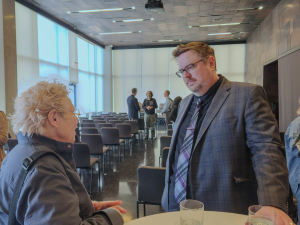My recent ordeal at the University of North Dakota illustrates some problems anyone interested in higher education would do well to heed.
First is that the method used to attempt to dismiss me, dismissal “for adequate cause,” is equally threatening to the tenured and nontenured faculty members. Intended to provide safety for the institution, if a faculty member commits a grave misdeed, the “adequate cause” firing cases that UND has used have proved there need not be any kind of grievous offense, instead, simply require that someone in an influential position wants to get rid of a faculty member for any reason. Given that any teacher probably has at least a few very unhappy students, consider this scenario: Someone powerful does not like professor X or is unhappy with something connected to X. That someone hears a complaint or two, however trivial, and plows through everything the unlucky professor X has ever done to build a case against him or her. Untruths, conjecture and tiny things never considered problematic enough to be brought up on their own merits are stacked to create an insurmountable wall of allegations. A recommendation is made for dismissal “with adequate cause,” and before he or she knows it, unlucky professor X is looking for work. Don’t think it can happen? It happened to me.
I had stellar student evaluations and annual faculty reviews. The annual reviews even gave high praise to my recruiting in particular, and yet, poor recruiting was one of the chief allegations against me.
Considering the dates and nature of some of the things stacked against me, my biggest transgression was that I am gay. Worse, I refused to hover in the closet, and God forbid, my partner and I decided to adopt a young gay man who was a student at UND. UND officials apparently panicked, overwhelmed with fears that the adoption might cost them a few students in conservative North Dakota. All professors should know that the same thing can happen to them, perhaps in totally different circumstances. Perhaps someone will not like your church or the fact that you are married to an alcoholic or that you wear brown shoes. The institution will build a case, it will wear you out and you will be gone. Fortunately, I escaped dismissal, but I no longer teach at UND. Who won?
The fundamental problem here is not homophobia or even possible conspiracy. It is that in today’s America, higher education has become nothing more than a commodity. Students and parents are the consumers, administrators run the business and professors are the salespeople. Professor David Noble of York University in Toronto warned of the “commodification of education” almost a decade ago, and it is clearly visible today. Schools compete furiously for students and often make programming decisions simply to be “in the running” for a larger number of potential students. Students and parents often pit schools against one another, especially considering financial aid. Most faculty members I know feel pressured during student campus visits to show prospective students “what they want to see” instead of allowing them to find out what a school is really like.
I know a music department where recruiting decisions have been made with full knowledge that the implementation of the decisions will lower the quality of the education the students will acquire. Not long ago, justifying the idea of lowering admissions standards, I heard a professor say: “Everyone deserves an opportunity to fail.” Fail? I thought education was supposed to be about helping students succeed!
What happens to those who don’t play along? Students ” as consumers ” now hold an unprecedented amount of power over professors. If a student doesn’t do well, it can’t possibly be his or her fault; it’s the professor’s fault for being too challenging. Exams are now “too difficult” instead of “thorough,” professors have “unacceptably demanding standards” instead of “very high expectations,” and administrators take student complaints at face value and assume the professor is guilty of any accusation. A friend of mine at another institution recently caught a graduate student committing flagrant plagiarism on a paper and was allowed to lower his grade only to a C. The student appealed and, despite my friend’s overwhelming evidence of the offense, the appeals committee raised the grade to a B.
Perhaps more frighteningly, another conductor testified against me at my hearing, complaining that I worked on singing technique and musical details instead of giving students enough “warm fuzzies.” Most of my students disagreed.
While professors are allowed little real authority and discretion, administrators have more power than ever and are wielding it disturbingly. Teachers who are perceived not to fit in (one of the accusations against me) are shown the door. What many seem to forget is that we are dealing with the minds of a generation of young people, and hence, with our nation’s future. Do we really want to teach an entire generation of youth that hard work isn’t truly necessary and that if they complain enough, requirements can be changed for them?
All that said, however, not all students are looking for an easy way out. At UND, I had the privilege of teaching some of the finest and most talented students I have ever known. Was I demanding? Yes. And when I faced trouble, they stood up for me. At risk to their academic and financial well-beings, they defied authority and stubbornly refuted charges, called falsehoods what they were and testified for me even under the threatening glare of university officials. Only two of my music department colleagues have called me since the dean tried to fire me last August. I believe they are afraid of possible university repercussions. My students, on the other hand, formed new choirs, asked me to conduct them and have been extremely faithful to those new groups. They have called, visited, written and testified for me.
I believe my case shows that students still respect and enjoy teachers who have very high expectations ” none of the accusations against me were of being too easy. Yet, although I was demanding, students knew I cared about them and their best interests, and their loyalty has known no end. UND had two complaints against me ” two ” mostly hearsay, and strongly refuted by eyewitnesses. Where was the justice and due process that should have given someone with my record the benefit of the doubt, and help and guidance if they were needed? I’m afraid there is no room left for that in institutions that are too concerned about keeping the business going at any cost.
Anthony Rogers-Reeves recently resigned as assistant professor of music at the University of North Dakota. Please send comments to [email protected].












